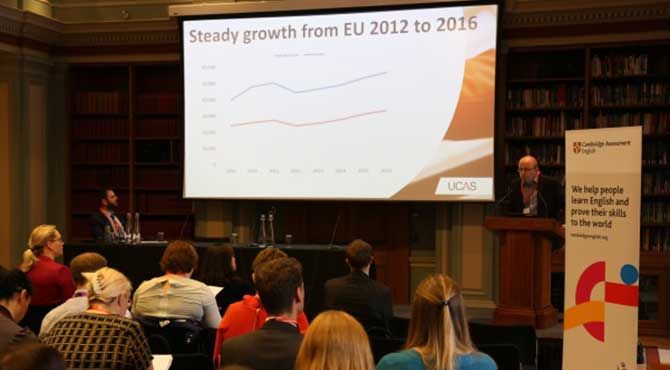A year on from the referendum, Cambridge Assessment English (Cambridge English) has assembled leading experts from the higher education sector to debate the impact of Brexit on international recruitment on UK universities, and the challenges faced by admissions teams, at an event in London. The need for greater collaboration between UK and European higher education institutions was a recurring argument of the day.

The 1-day seminar, entitled: Leading the way in International Admissions and Recruitment. Brexit – one year later, was facilitated by Cambridge English and generated discussion and debate between industry professionals from UCAS, UK NARIC and UK universities, who assessed the current landscape for international recruitment in higher education.
Petra Olsson, Regional Recognition Manager, Cambridge English, opened the seminar and provided some context regarding what departments, such as Cambridge English, are doing to strengthen ties to Europe since the referendum. She commented: “The UK may be leaving the EU, but Britain’s educational and cultural institutions remain just as international in outlook as ever – by working together we can ensure a prosperous future for student mobility. Cambridge English has worked with the European institutions for more than 40 years and, looking ahead, we will maintain our strong relationship with the Council of Europe, and will continue to build on our collaborations with the European Parliament and the European Commission.”
The seminar, chaired by Chris Lyons, Head of Research & Data Group, UK NARIC, was attended by HEI international admissions and recruitment professionals from over 60 UK higher education institutions – including top universities such as King’s College London, University of Cambridge and University of Oxford, as well as notable arts and sports institutions such as Royal Academy of Dance, University for the Creative Arts, Royal College of Music, and UCFB.

The leading theme of the day was addressed by Mark Wilson, International Market Manager, UCAS, during his presentation entitled: Brexit and its impact on the recruitment and admission of EU applicants. Wilson summarised the implications of the referendum for undergraduate recruitment: “Pre-Brexit anxiety and uncertainty has had a disruptive impact on international admissions. Where we have previously seen strong year-on-year growth, during the 2017 cycle, there has been a decrease in EU applicants by 9% in October 2016, 7% in January 2017, 6% in March 2017 and 5% in June 2017, compared to the previous cycle.”
“One of the biggest repercussions of the drawn-out process of Brexit negotiations for UK Universities may be the gradual withering away of the UK’s strong position and a loss of share to competitors. To sustain undergraduate recruitment from the EU, we now need to respond with innovative delivery and partnership models that will help mitigate some of the potential financial and visa issues. A challenge will be to lobby for clear transitional arrangements and clear messaging for future students as soon as possible – knowing where things stand will be of value to prospective students. A collective, sector response is needed and UCAS is keen to play a role in supporting that.”

Paul Raybould, Director of Marketing and Marketing Intelligence, EMEA & APAC, Hobsons, provided insight into current European student trends, as he analysed the results of the Hobsons’ International Student Survey 2017; which surveyed over 62,000 prospective international students from 197 countries. The results suggested that greater investment in EU Transnational Education (TNE) could provide an answer to falling student numbers, with the majority of EU students surveyed saying that they would be likely to study at an EU branch campus of a UK university post-Brexit; however they would prefer not to study in their home country.
The prospect of greater investment in TNE as a solution to EU recruitment was also highlighted during a panel discussion, which included representatives from University of Edinburgh, University of Sussex and University of Bedfordshire. Martin Hookham, University of Sussex, warned: “TNE can be a drain on resources at the home campus – universities should become more proactive in building European relationships and partnerships, and a greater focus should be placed on genuine internationalisation over international recruitment.”
The future for the UK’s outward mobility landscape was reviewed, as delegates heard about the implications of Brexit for Erasmus+ – the European Union funded programme for education, training, youth and sport. Naquita Lewis, Erasmus+ Programme Lead for Higher Education, British Council, explained: “Erasmus+ gives young people the opportunity to go abroad for a different learning environment, and to have personal and social experiences that build confidence, communication and people skills which are proven to boost employability. The skills that they develop are skills for life and are absolutely the skills that we need to make our economies perform better. They are not just personal skills.”

Lewis went on to explain the implications of Brexit on the programme. She said: “So far we have not seen a decrease in interest in Erasmus+ since the referendum, in fact we are awarding more funding for mobility grants within Europe in 2017 than ever before. Looking to next year, the UK Government has confirmed that the Treasury will underwrite grant agreements for Erasmus+ signed while the UK is still an EU Member State, even if payments continue beyond the point of the UK’s EU exit date.”
The event was concluded by the chair, Chris Lyons, who summarised: “It is easy for individuals and establishments in the education sector to focus on the negatives that Brexit has uncovered, however, with change always comes opportunity. It is up to us to educate the communities around us, whether in the UK or globally, on the impact and opportunities we face – we may not have been prepared for the result of the referendum but we must now prepare others for its impact.”
Cambridge Assessment English News

